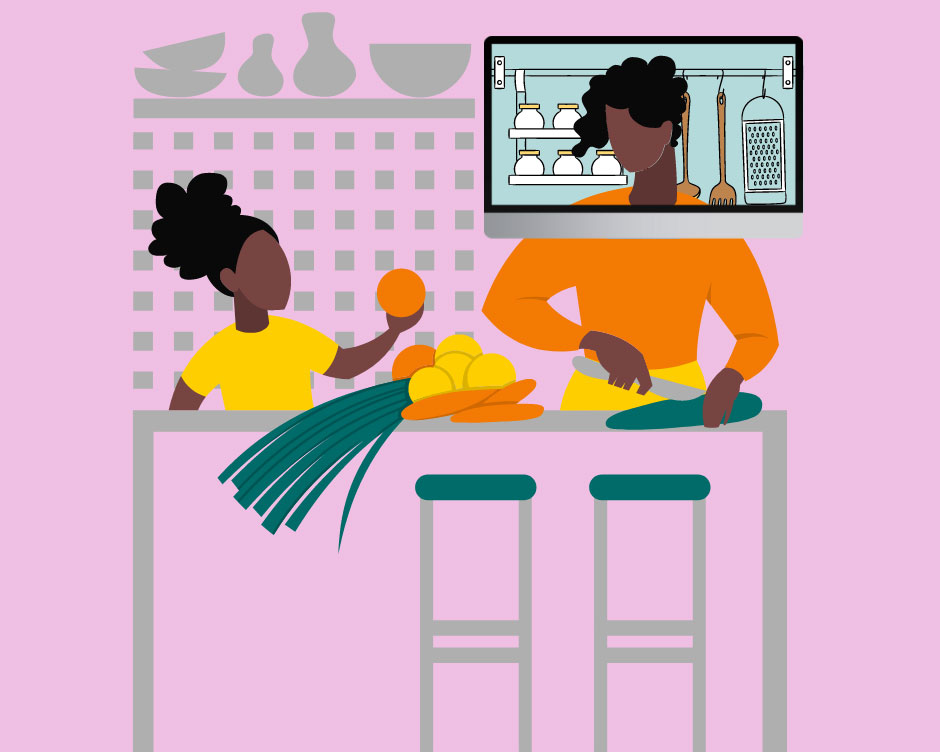It’s the middle of the night and my growling stomach won’t let me sleep. I swing my legs across the bed, slide into my slippers and shuffle towards the kitchen. As if heaven has opened up, a bright fluorescent light begins to shine in my face. However, instead of blessings I find an empty fridge filled with half eaten leftovers. I ask myself, ‘Is this adulthood?’
When I lived with my parents, opening the fridge guaranteed access to delicious food prepared by loving hands. A fresh pot of stew, jollof rice, okra soup, maybe egusi soup if my mom wanted to switch things up. But since starting college and moving out of the house, the only time I get a home-cooked meal is when I find time to endure a cross-state bus ride home. For the first semester or two, this was okay, but eventually life got busier and trips home became less frequent. Despite this, my cravings for mom’s homecooked food never ceased.
Now, this could easily be resolved if I knew how to cook my favourite Nigerian dishes, but growing up, I spent too much time studying, participating in school clubs and avoiding housework to master this element of domestic life. As I stared into my empty fridge, both my stomach and I began to realize the cost of my absence in the kitchen.
Therefore, I did the only thing I could think of. I rang my mom. At first things were going well. Excited by my new interest in cooking, she began to eagerly describe the list of ingredients to make a pot of stew: “tomatoes, onions, habanero peppers, salt, garlic…” However, ingredients are only one part of the equation. Measurements are an essential element of any good recipe, so I asked her, “How much do I need of each?” to which she responded, “You just know.” But how could I know, when I had no idea what I was doing?
I wasn’t the only person who struggled with learning from a parent. Nigerian American Ijeoma Faleye called her mom for a crash course on all things Nigerian food when she moved out. The process wasn’t easy.
“I’d watch her but she just goes so fast,” she says. “Sometimes it was just too many steps for my brain and then because I don’t eat certain dishes all the time, by the time I get around to actually making it again I’ve forgotten the steps.”
“I think at one point it was hard, because I was really interested in the beginning and then midway though I start zoning out. So then I’m slowly leaving the vicinity and she’s like, ‘Where are you going?!’”
With interest and focus lacking, Faleye began to mix modern elements to help her refine her cooking style.
“Over time I started using other online resources, like Youtube channels and blogs,” she says. “I feel like I fused both worlds. I’ve taken some of her recipes, seen how other people do it and then over time kind of forged my own style.”
Like Faleye, I eventually abandoned the idea of learning from my mom and referred to the second-greatest teacher I’d ever known, Google. A quick search of the phrase “how to make jollof rice” quickly populated my computer with millions of results on how to cook the famous Nigerian dish. As a visual learner, I gravitated toward the video recipes and began my journey.
Some recipes looked promising with lots of views and comments from people who said their family members loved the recipe. While others, like the BBCs Good Food Jollof rice recipe, looked set to disappoint. With three out of five stars, one reviewer called the recipe “an abomination.”
Through trial and error, I was eventually able to land on a recipe that seemed just right. Videos from channels like SisiYemmieTV and Sisi Jemimah’s Recipes become my saving grace, the sound of their voice reminded me of the sweetness and humour of my aunts back in Nigeria. Their instructions were comical, with a stern reminder to have all your ingredients ready and a focused mind if you want to make a meal that “your husband will love”. While I wasn’t concerned about cooking for my non-existent spouse at the time, once I became more confident in cooking the dish it was nice to receive praise from friends and family who ate my food.
My cooking journey also showed me that a full fridge is not just a result of skill, it is also a privilege of time. Time to think of a meal, travel to the grocery store, shop for ingredients, and eventually cook – not to mention the financial privilege involved. Of the four steps, reaching the grocery store was always the hardest part for me.
When I was a broke college student with no car, I carried a giant suitcase filled with groceries onto the bus. The journey was an hour long – both ways and after traveling all day to buy my ingredients, I was too exhausted to cook. But over the years, I’ve learned to cook jollof rice, stew, okra soup, pepper soup, and more. While it’s a sturdy base of options that get me through the week and satiates my need for a homecooked meal there are hundreds of traditional recipes that I still don’t know. Fortunately, I can always turn to the internet to learn those dishes, because if there is anyone that has the answers it’s my YouTube Grandma’s.
Read More

